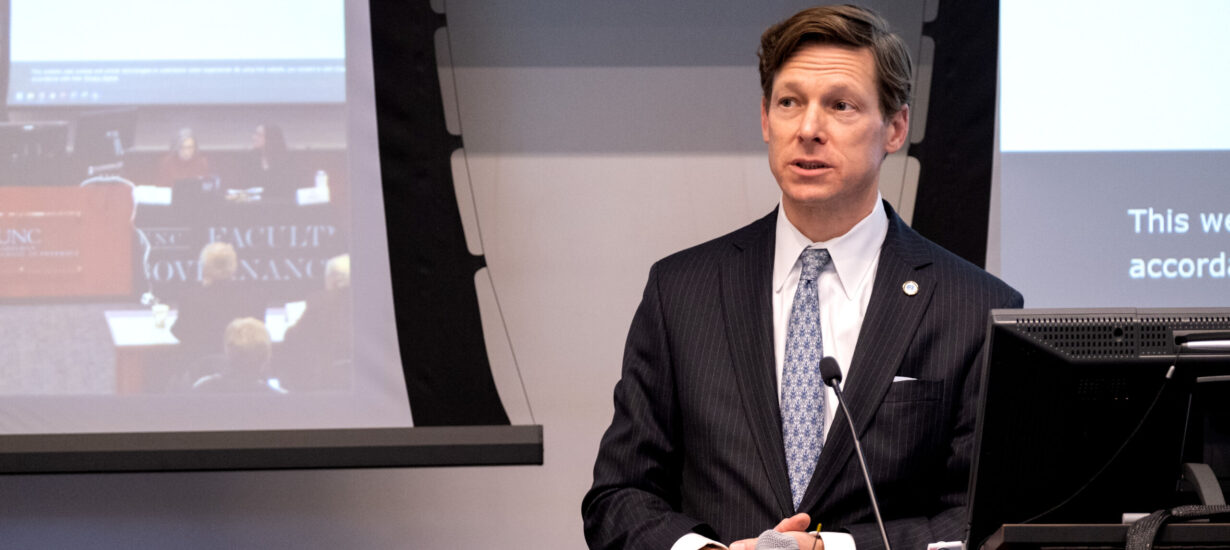Roberts: Student Centers Safe From DEI Policy Change

Student centers at UNC will not be affected if the Board of Governors votes next month, as expected, to change its current diversity policy, according to Interim Chancellor Lee Roberts.
Speaking during the final UNC Faculty Council meeting of the semester April 26, Roberts said he was told UNC System President Peter Hans has indicated the board’s impending action won’t lead to the closing of any centers, which are places students find community with others who are similar in race or gender identification. Roberts emphasized the board hasn’t yet taken final action on the UNC System’s current diversity policy, although it appears it is poised to eliminate diversity, equity and inclusion positions throughout the 17-campus system when the board meets May 22–23.
“I underscore what Beth [Moracco, chair of the faculty] said about the fact that there is not just an opportunity but an eagerness for comment and feedback from the faculty, from students and staff, from chancellors,” Roberts told the council. “Neither I nor, I don’t believe, any other chancellor saw the policy before it was posted the day before the committee meeting, but now is the opportunity for comment and feedback.”
Earlier this month the Board of Governors’ committee on university governance voted to “repeal and replace” the UNC System’s current DEI policy with one that would likely eliminate positions at North Carolina public universities that oversee DEI efforts and policies. Any savings would be “redirected to initiatives related to student success and well-being,” according to the proposed change.
Many insist the new policy does not eliminate DEI altogether. According to the new policy, system campuses will continue to ensure “students of all backgrounds are welcomed, included, and supported,” and they say the policy leaves open the possibility that some DEI offices and initiatives could remain in some way, with schools being able to, according to the policy language, “continue to implement programming or services designed to have a positive effect on the academic performance, retention, or graduation of students from different backgrounds, provided that programming complies with the institutional neutrality” as set out in the new policy.
Roberts said he thinks the language of the proposed policy change makes it clear academic freedom will not be affected. “The policy by its own terms does not implicate anything happening in the classroom,” he said. “I was told [Hans] said that it doesn’t affect the student centers, so that’s the Women’s Center, the Stone Center, centers like that.”
In addition to the Carolina Women’s Center and the Sonja Haynes Stone Center for Research in Black Culture and History, UNC operates centers for Latino, Asian American, American Indian and LGBTQ students, as well as a Veterans Resource Center.
Many state universities have hired diversity officers who oversee programs and initiatives related to DEI. Carolina has a vice provost for equity and inclusion who also serves as the chief diversity officer.
Roberts said during the Faculty Council meeting the University was founded to reflect and serve the state, which is changing and diversifying rapidly. “We have no choice but to reflect that,” Roberts said. “That’s who we are. And equally as important, we don’t just reflect it on paper. It’s crucial that when people get here, if they’re students lucky enough to earn a place here, faculty or staff working here, that they feel welcome, that they feel as though they belong, they feel as though this is a place for them.”
UNC has more than 800 student organizations. Roberts said he wants Carolina to be a place where all students can find a home. To achieve that, he said, Carolina must be aggressive in its outreach, engagement and recruitment of students “who reflect the breadth and depth and growing and changing diversity of this incredible state.”
— Laurie D. Willis ’86
